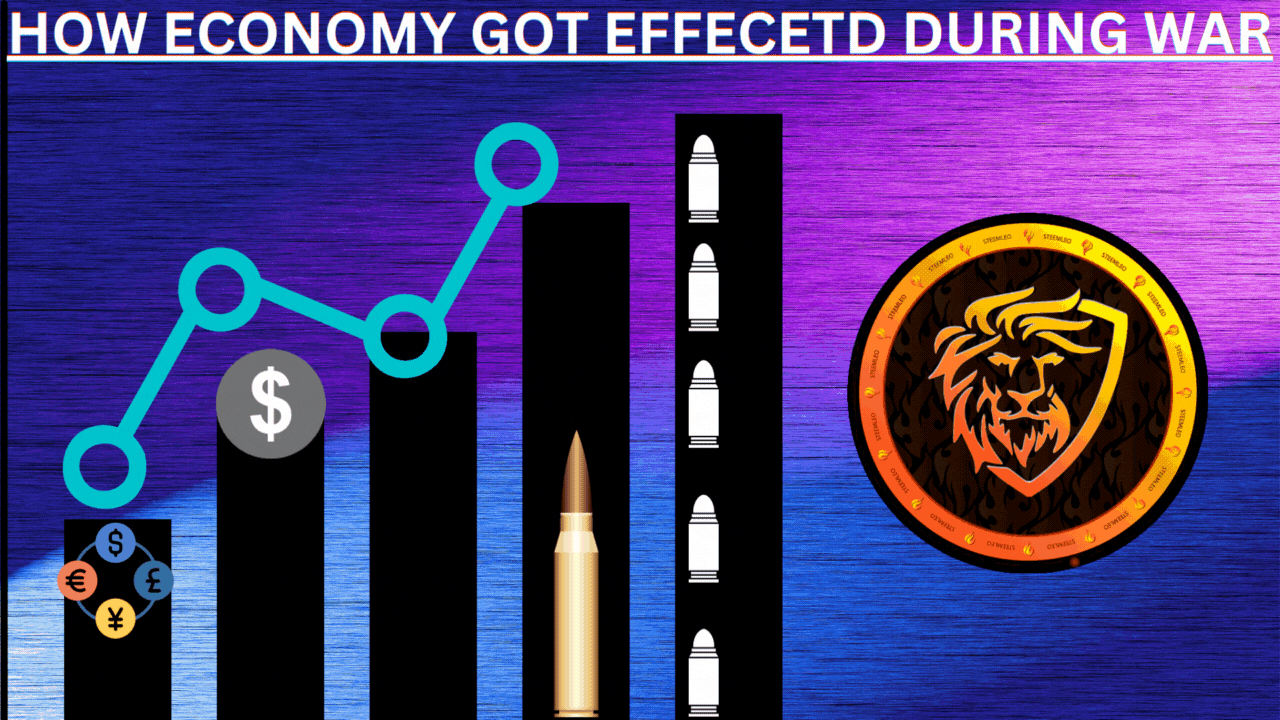HOW ECONOMY GOT EFFECETD DURING WAR
Hey Leo Warriors,
I hope all of you are well and spent your daily life with full of craziness. Dear Lions, We all know how War effect us not just those who were in war but effect those who are far away from war. We live on that Generation where every person, Country, Continental are all connected on a single chain. Let's Deep Into the topic to know more about this, I hope you like this blog :-


War has a profound and multi-faceted impact on economies, affecting nations, industries, and individuals alike. The economic consequences of war are diverse, ranging from immediate disruptions to long-term repercussions. In this article, we will explore the extensive effects that war can have on economies and delve into specific aspects such as infrastructure, trade, human capital, government spending, and the lasting consequences of conflict.
War can have a significant and wide-ranging impact on a country's economy. The effects of war on an economy can vary depending on factors such as the duration of the conflict, the scale of military operations, the level of destruction, and the economic structure of the country involved. Here are some common ways in which war can affect a country's economy:
Destruction of infrastructure : Wars often result in the destruction of critical infrastructure such as roads, bridges, power plants, communication networks, and factories. Rebuilding these structures requires substantial financial resources and can take years or even decades, which can hinder economic development.
Disruption of production and trade : During a war, industrial production and trade are disrupted due to factors such as damage to factories, disruption of supply chains, and restrictions on movement of goods. This can lead to a decline in output, reduced exports, and scarcity of essential goods, which can result in inflation and higher prices for consumers.
Human capital losses : Wars can result in significant loss of life, injuries, and displacement of people. The loss of skilled workers, professionals, and entrepreneurs can have long-term consequences for economic development. Additionally, the physical and psychological trauma experienced by individuals can impact productivity and workforce participation.
Increased government spending : Governments often increase military spending during times of war, diverting resources away from other sectors such as healthcare, education, and infrastructure development. This can lead to budget deficits, increased borrowing, inflationary pressures, and a burden on future generations through higher levels of public debt.
Displacement of population and refugee crises : Wars often force people to flee their homes, leading to internal displacement or the creation of large numbers of refugees. This can place a strain on host countries' resources and social services, leading to increased government spending and reduced economic productivity.
Decreased investment and business confidence : The uncertainty and instability associated with war can discourage domestic and foreign investment, as businesses may hesitate to commit capital under such circumstances. This can result in a slowdown in economic growth and reduced job opportunities.
Long-term economic repercussions : Even after a war ends, the economic consequences can persist. Countries may continue to face challenges in rebuilding infrastructure, restoring trust and stability, attracting investment, and addressing social and political tensions. Post-war economies often require significant investment in reconstruction, reconciliation, and social welfare programs to recover and transition to sustainable development.
- Note : Economic effects of war can vary widely depending on the specific circumstances and context of each conflict. Some countries may experience a quicker recovery and rebound, while others may face prolonged challenges in rebuilding their economies and societies.

HOW TO SAVE ECONOMICS/COUNTRIES MONEY ::
Saving money during times of war can be challenging due to the uncertain and disruptive nature of such periods. However, here are some strategies that individuals and households can consider to potentially save money:
Budgeting and financial planning : Create a budget to track income and expenses carefully. Analyze your spending habits and prioritize essential needs over wants. Set specific financial goals and allocate a portion of your income towards savings.
Reduce non-essential expenses : Cut back on discretionary spending, such as entertainment, dining out, and non-essential purchases. Focus on meeting basic needs and finding cost-effective alternatives.
Conserve resources : During times of war, scarcity of resources may arise. Practice resource conservation to minimize waste and reduce expenses. For example, save energy by turning off lights and appliances when not in use, conserve water, and utilize essential resources efficiently.
Stock up on Essentials : In uncertain times, it can be beneficial to stock up on essential items that may become scarce or expensive during the war. This can include non-perishable food items, toiletries, medicines, and other necessities. However, be mindful of purchasing within your means and avoid hoarding.
Seek cost-saving opportunities : Look for discounts, promotions, and sales to save money on necessary purchases. Compare prices and consider buying in bulk for items that are used frequently and have a long shelf life.
Explore alternative transportation : If feasible, consider using public transportation, carpooling, or cycling instead of relying on private vehicles. This can help save on fuel and maintenance costs.
Review insurance and financial commitments : Assess your insurance policies, loans, and financial commitments. Evaluate if there are opportunities to negotiate better terms, reduce coverage, or consolidate debts to save on interest payments.
Seek government assistance : During wartime, governments often provide support programs and assistance to individuals and families affected by the conflict. Stay informed about available benefits, subsidies, and relief measures that may help reduce financial strain.
Generate additional income : Explore ways to supplement your income through part-time jobs, freelancing, or utilizing skills you possess. This extra income can be allocated towards savings or building an emergency fund.
Prioritize financial security : During times of war, it is crucial to prioritize financial security and allocate resources towards building an emergency fund. Having savings can provide a buffer during uncertain times and help mitigate potential financial hardships.
NOTE : Saving money during war can be challenging, and individual circumstances may vary. It's important to adapt these strategies to your specific situation and remain flexible in response to changing circumstances.

CONCLUSION ::-
.gif)
the effects of war on economies are extensive and far-reaching. Armed conflicts disrupt economies through the destruction of critical infrastructure, which impedes economic development and hampers the flow of goods and services. Additionally, war disrupts production and trade, resulting in reduced output, inflationary pressures, and constraints on businesses and consumers.
Furthermore, the loss of human capital during war, including skilled professionals, workers, and entrepreneurs, significantly impacts a nation's workforce and potential for economic growth. The physical and psychological trauma experienced by individuals further hinders productivity and workforce participation, exacerbating the economic consequences.
War also leads to increased government spending as resources are allocated towards military endeavors, diverting funds from essential sectors such as healthcare, education, and infrastructure development. This can result in budget deficits, increased borrowing, inflationary pressures, and a burden on future generations through higher public debt. Even after a war ends, its economic repercussions can persist. Countries face challenges in rebuilding infrastructure, restoring trust and stability, attracting investment, and addressing social and political tensions. Post-war economies require significant investments in reconstruction, reconciliation, and social welfare programs to recover and transition to sustainable development.
To achieve long-term economic stability and prosperity, it is essential to understand and address the economic consequences of war. This includes prioritizing peace-building efforts, promoting diplomatic solutions, investing in infrastructure development, human capital, and social well-being, and fostering international cooperation to support post-war recovery and sustainable development. By working towards peaceful resolutions and investing in rebuilding and reconciliation, societies can overcome the economic scars left by war and strive for a more prosperous and inclusive future.

That's all for the day Guyz, I hope you enjoyed my blog.
You Guyz are awesome ☺️
Stay safe Be Cool 😎


Posted Using LeoFinance Alpha
This post has been manually curated by @bhattg from Indiaunited community. Join us on our Discord Server.
Do you know that you can earn a passive income by delegating to @indiaunited. We share more than 100 % of the curation rewards with the delegators in the form of IUC tokens. HP delegators and IUC token holders also get upto 20% additional vote weight.
Here are some handy links for delegations: 100HP, 250HP, 500HP, 1000HP.
100% of the rewards from this comment goes to the curator for their manual curation efforts. Please encourage the curator @bhattg by upvoting this comment and support the community by voting the posts made by @indiaunited.
This post has been manually curated by @bhattg from Indiaunited community. Join us on our Discord Server.
Do you know that you can earn a passive income by delegating your Leo power to @india-leo account? We share 100 % of the curation rewards with the delegators.
100% of the rewards from this comment goes to the curator for their manual curation efforts. Please encourage the curator @bhattg by upvoting this comment and support the community by voting the posts made by @indiaunited.
Congratulations @sabujdip! You have completed the following achievement on the Hive blockchain And have been rewarded with New badge(s)
Your next target is to reach 15000 upvotes.
You can view your badges on your board and compare yourself to others in the Ranking
If you no longer want to receive notifications, reply to this comment with the word
STOP